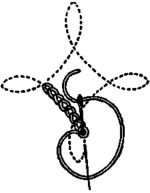Someone ask me. Regarding in "Coptic and Stitch".
OK. This is an information about Coptic binding from Wikipedia.Coptic
Definition from Wiktionary,
Wikipedia has an article on:
Adjective
Coptic (not comparable)
1. Of or pertaining to the Copts, Coptic Orthodox Church or to the Coptic language.
Arabic: قبطي (ar) (qíbTiy) Armenian: ղպտիական (hy) (ġptiakan) Finnish: koptilainen (fi) French: copte (fr) German: koptisch (de) Italian: copto (it) (all senses)
Macedonian: коптски (mk) (kóptski) m. (all senses) Polish: koptyjski m. (all senses)
Noun
Coptic (uncountable)
Coptic binding
The Coptic binding style (BANGKOK BINDERY)
Coptic binding refers to methods of bookbinding developed by early Christians in Egypt, the Copts, and used from as early as the 2nd century AD to the 11th century. The term is also used to describe modern bindings sewn in the same style.
Simple Coptic binding (model)
Coptic bindings, the first true codices, are characterized by one or more sections of parchment, papyrus, or paper sewn through their folds, and (if more than one section) attached to each other with chain stitch linkings across the spine. In practice, the phrase "Coptic binding" usually refers to multi-section bindings, while single-section Coptic codices are often referred to as "Nag Hammadi bindings," after the 13 codices found in 1945 which exemplify the form.
Multi-section Coptic bindings
Multi-section Coptic bindings had cover boards that were initially composed of layers of papyrus, though by the 4th century, wooden boards were also frequent. Leather covering was also common by the 4th century, and all subsequent Western decorated leather bindings descend from Coptic bindings.
Approximately 120 original and complete Coptic bindings survive in the collections of museums and libraries, though the remnants of as many as 500 Coptic bindings survive.
Modern Coptic binding can be made with or without covering leather; if left uncovered, a Coptic binding is able to open 360°. If the leather is omitted, a Coptic binding is non-adhesive, and does not require any glue in its construction.
Artisans and crafters often use coptic binding when creating hand made art journals or other books.
Chain stitch
Chain stitch is a sewing and embroidery technique in which a series of looped stitches form a chain-like pattern. Chain stitch is an ancient craft - examples of surviving Chinese chain stitch embroidery worked in silk thread have been dated to the Warring States period (5th-3rd century BC). Handmade chain stitch embroidery does not require that the needle pass through more than one layer of fabric. For this reason the stitch is an effective surface embellishment near seams on finished fabric. Because chain stitches can form flowing, curved lines, they are used in many surface embroidery styles that mimic "drawing" in thread.
Traditional embroidery in chain stitch on a Kazakh rug, contemporary.
Machine embroidery in chain stitch, often in traditional hand-worked crewel designs, is found on curtains, bed linens, and upholstery fabrics.
Variations of the basic chain stitch include:
Chain stitches are also used in making tambour lace, needlelace, macramé and crochet.
Hand embroidery
Chain stitch and its variations are fundamental to embroidery traditions of many cultures, including Kashmiri numdahs, Iranian Resht work, Central Asian suzani, Hungarian Kalotaszeg "written embroidery", Jacobean embroidery, and crewelwork.Machine sewing and embroidery
Chain stitch was the stitch used by early sewing machines; however, as it is easily unraveled from fabric, this was soon replaced with the more secure lockstitch. This ease of unraveling of the single-thread chain stitch, more specifically known as ISO 4915:1991 stitch 101, continues to be exploited for industrial purposes in the closure of bags for bulk products.Machine embroidery in chain stitch, often in traditional hand-worked crewel designs, is found on curtains, bed linens, and upholstery fabrics.
Hand Variants
"Drawing" or outlining in basic chain stitch
Back-stitched chain stitch, Braided stitching, Cable chain stitch, Knotted chain stitch
Open chain stitch...and more.....





ไม่มีความคิดเห็น:
แสดงความคิดเห็น